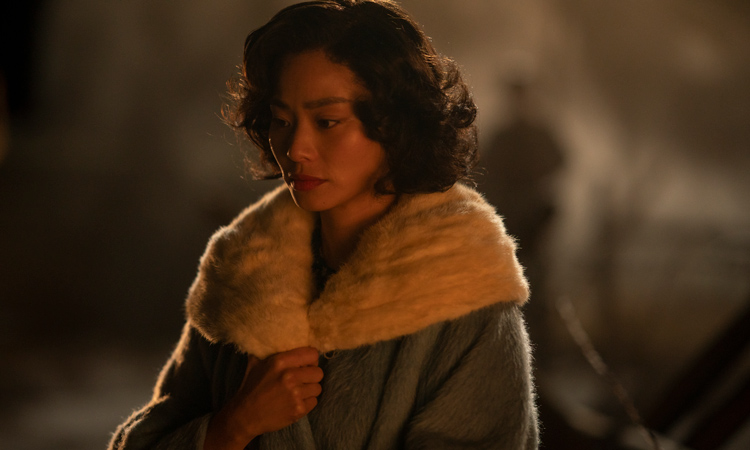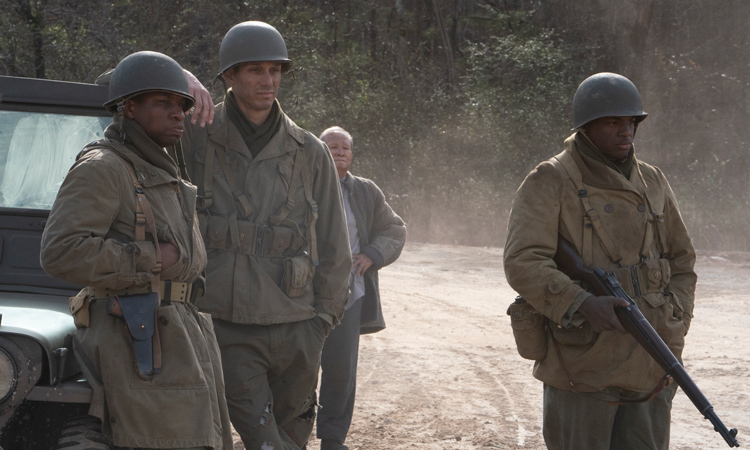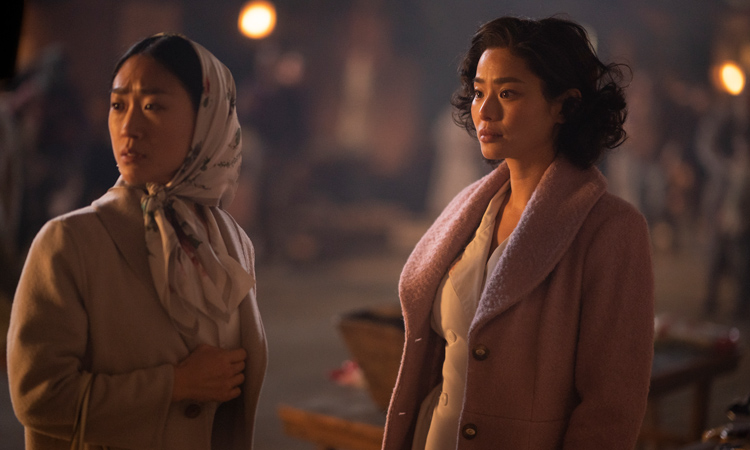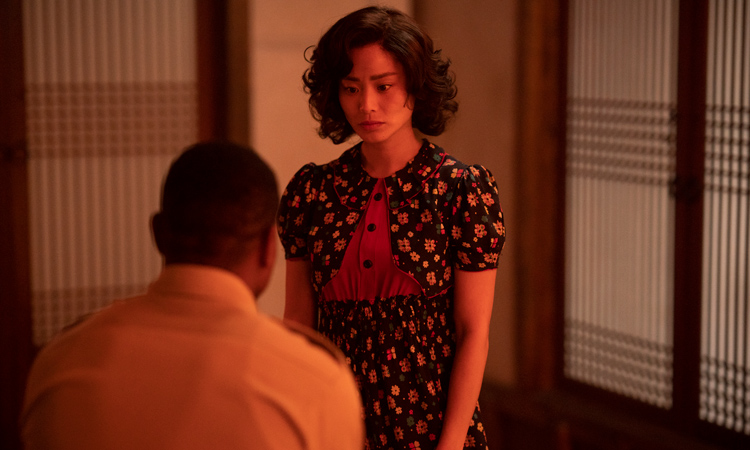Lovecraft Country has been offering up episode after episode of thought-provoking, stunning television and the most recent, episode six, ‘Meet Me In Daegu’, has been one of the most explosive yet.
The episode follows the story of nursing student, Ji-ah, during the Korean War where she meets Lovecraft Country protagonist Atticus while he’s in the army. However, Ji-ah isn’t all that she seems – she’s actually been possessed by a kumiho spirit, who her mother conjured with the help of a shaman to wreak revenge on her mother’s husband, who has been raping Ji-ah. The kumiho spirit must take 100 male souls using her deadly nine tails in order for Ji-ah to be human again. However, the possessed Ji-ah is carving a life of her own; forming friendships, falling in love with American movies and making connections, even though her mother has repeatedly told her she is incapable of such things. But she’s fallen in love with Atticus, and after unintentionally revealing her nine tails and seeing a dire future for him, Ji-ah refuses to take her last soul to be human and ends the episode visiting the shaman to see how she can alter Atticus’ fate.
‘Meet Me in Daegu’ is an hour and a half of television at its very best and we spoke to actress Jamie Chung who plays Ji-ah about Lovecraft Country, the Korean War and the complexity of Ji-ah…

‘Meet Me In Daegu‘ is like a mini movie within this series! What were your thoughts when you read it?
Well, my first thought was ‘there’s no way that this character exists!’ and there’s no way that they’re bringing this character on the show. How is it going to tie in?
When I auditioned, I was kind of familiar with HP Lovecraft and I was familiar with Misha Green’s work. There were only two scenes for the audition, but I knew it was something special because it’s mostly in Korean and the scenes that they chose were so… there’s so much to do with it! It’s rare that you get these kinds of roles and it was something that I knew that I wanted, and then once I read the script I was like ‘this is incredible’.
This is a standalone back story of who Ji-ah is. This takes place in the Korean War, it talks about coloured soldier troops and how they’re treated, it talks about everything and then some! Yeah, it was insane, like you said it was a mini-movie. It was treated like a mini-movie.
When I got the role I was like, ‘this is amazing’. But then also I was like ‘this is terrifying’. English is my first language and my parents, who were born in Korea, they don’t speak a lot of English and our conversations are just simple. It’s nothing to what I had to learn, so thankfully I had the support and an immense amount of time to prepare for this. I had about six months to prepare. It was the last episode they decided to shoot during production because they also had to build all the sets which were also incredible.
So all of the sets were built…?
They built all of that from scratch and it was super authentic. I believe they consulted with someone from Korea who builds those traditional houses. But what I love and respect about everyone was that they did their research. There was an immense amount of research that went into every episode, but especially episode six, for authenticity.
The episode is set during the Korean War. Did you do much research beforehand?
First of all, it’s really difficult to find a book written by a Korean woman to share her experiences of what it was like to grow up during the time of war. My parents and my entire family lived through the Korean War and it’s something they rarely talk about because it’s too painful. My family did lose everything in the Korean War and my dad was just shy of the age of being drafted into the war.
You know, in growing up it was such a sensitive topic and I remember watching reruns of M.A.S.H. on TV and they would come by and shut off the TV. They were there [and] it feels like they’re making fun of the Korean War, and there’s nothing funny about it. So many lives were lost and it’s rare that people talk about the purpose of it. It was part of an agenda to stop communism from spreading in Asia and that’s really what it was. End of story.
Yeah a lot of research was required in order to bring this character to life. What class was she? She was middle class. Okay, great. She’s middle class without a father figure – okay that brings a lot of shame. It’s the wintertime? What food are they preparing? They’re preparing kimchi and putting it in pots; that’s what the rations are going to be made of. Once all that food runs out, what was the food that was introduced to their diet? Oh, it was Spam? It was foods from these army bases. That’s still a big part of Korean culture and cuisine today, you know; like sausages and Spam and hot dogs and whatnot!
It required a lot of research, but it’s also experiences and lessons that I learned from my family. It was a great deep dive into my own culture and it’s something that I didn’t shy away from but gave little focus to in my life. It was really interesting to dive really deep into that and revisit that.

The episode also focusses on some tough topics of injustices and segregation…
Yeah, tough, but then also so timely and relevant today. Two years prior to the Korean War, it was put into law that they were going to desegregate the troops, but in fact there were still segregated when they were in Korea and in Vietnam [and then] they come back after the war, to a segregated America? I mean, it’s just horrific. But it really brings up a lot of social injustices. That’s what I love about this show; they constantly push the envelope to tell these stories that people shy away from or are like, ‘no, that’s in the past’. No, that’s messed up and it’s still unfortunately so relevant today.
Had you been told about the general themes of Lovecraft Country and your episode before you started filming?
[Yeah that the show] takes place in segregated America [and this episode] takes place during a flashback of the Korean War, and this character is the nine-tailed fox spirit, kumiho. So yeah, all of those all those facts were laid out. They did also warn that this role requires a lot of nudity. Which is absolutely necessary to tell this love story because the physicality has so much to do with the kumiho, and her journey to seek revenge in order to erase the shame in their family of sexual assault. Yeah they did clue us in prior to [and] during the auditions of what this character was and it ties in quite nicely.
Ji-ah has taken the souls of 99 men, and she experiences the life of every soul she takes. This makes for a pretty complex character who is both a naive, new spirit and someone who’s lived nearly 100 lives…
Yeah, if you think about it, she’s a spirit who has taken the souls of [99] men so all of her experiences and her memories are of these [99] men. So how does she act like a young woman? She watches Judy Garland movies because she’s like ‘oh this woman gets love and she gets it all, so I want to be like her’. So her mannerisms are very Judy Garland.
Then she meets this other young woman, which is the only friendship that she’s ever known. So now she knows friendship between two women, she understands what it’s like to be touched and to be cared about. [There’s] so much physicality – it’s the physicality in order to seduce a man and to lure him. Of a friendship and being held or hugged or being cared for. The physicality of what it’s like to fall in love and to be completely overwhelmed with lust and love. Then you have the physicality between Ji-ah and her mother – having that motherly embrace and the touch. [There’s] just so much going on…

There is a lot going on! How do you prepare for a role like this?!
Oh my goodness, it required so much prep work and diving into who this person is, what era she lived in, what her diet was. Her relationship with her mother, always wanting validation and [her] pure innocence… I guess I would describe [her] like a Bambi. Like some kind of a newbie. She’s quite naive, so she’s learning everything as she goes and everything is a new experience for her.
But one thing which I think really speaks for this character is [her] watching movies and that’s how she understands ‘oh that’s what a mother/daughter relationship is supposed to be like. Oh so that’s what love is supposed to be like. Oh, they sing about it because that’s what they do’. It’s totally fictional. Her whole point of view is through the experiences of others, which is so wild.
She’s a murderer but she’s also been forced to take the souls of men. Is she a sympathetic character do you think?
Okay now that’s an interesting word: ‘sympathetic’. That word never came up when I was doing my work for Ji-ah. I never sympathised with her. I always found her to be a very powerful character. I sympathised with the daughter who was sexually harassed and then, you know, in a way she died when the kumiho took over her body. From the perspective of this kumiho; the kumiho is powerful. She will seduce you and then penetrate you and then literally pull you apart like. She’s quite powerful.
You know, I actually take that back because I do sympathise [with her] and the fact that she never had love and a normal childhood, I guess, so yeah, there’s that. But I was never worried about anyone liking her because from her perspective, it’s just ‘I wanna find love’ and she found that love with Atticus.
When she takes the souls of men, she produces nine deadly tails that penetrate them. Did you have any idea of the imagery when you were filming?
The special effects team drafted out all of these incredible images and it was plastered all over! There’s a meeting conference room where we had read the scripts out-loud and whatnot, and they were everywhere. So yes, I was given a very detailed vision of what it was going to look like and how they were not going to hold back from any of these horrific images. Whether it’s in the hospital room, whether it’s in the bedroom, or the horrors of living through a Civil War of one nationality killing each other and the suspicion and the intensity of that time. There was no holding back in any of the departments.

What is it about Lovecraft Country that appealed to you?
What appealed to me [is] that it isn’t shying away from horrific social injustices that have been experienced in the United States for hundreds of years. It isn’t shying away from how ugly people can be. How humans can be towards other humans and shining a light on that. I’m just so proud of a show that is really pushing the boundaries and not shying away from any disgusting historical facts and events that have occurred in the States.
I think that’s the only way to really heal from something. Instead of just denying it or brushing it under the rug, that’s the total opposite of what the show is doing and I’m so so proud to be a part of that. So kudos to the storytellers, to people like Misha; a woman of colour and in a male-dominated field so it’s incredible what she was able to do.
Without any spoilers, what can we expect from Ji-ah in the rest of the series?
It’s set up here to bring the past [back]; a past that Atticus was shying away from. It’s something he’s scared to bring up and so now I do believe that he’s going to be confronted with that past. [You also] see a love triangle happening… it’s certainly there and I think that’s something that’s also going to be addressed.
Lovecraft Country is available to watch on-demand on Sky Atlantic and NOW TV.
